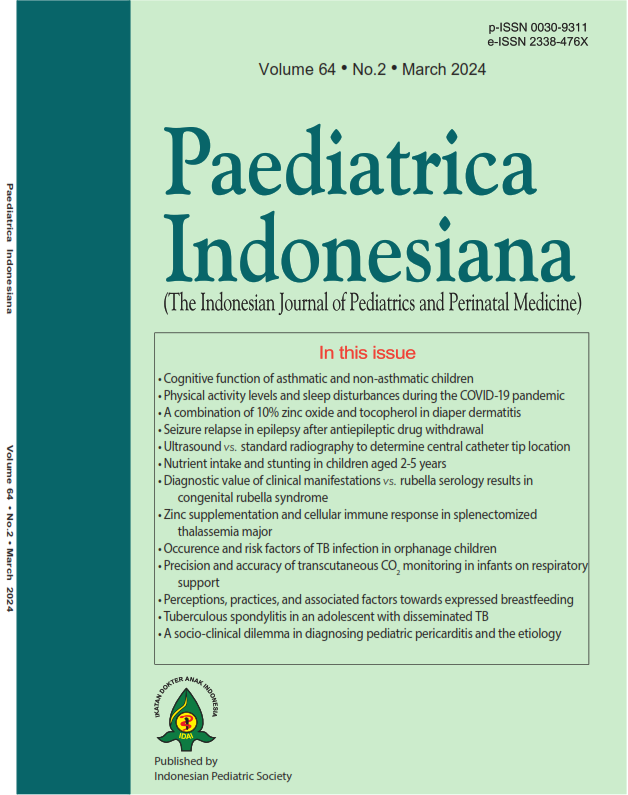Zinc supplementation on cellular immune response in splenectomized thalassemia major
Abstract
Background: The immune response of thalassemia patients is different from usual; therefore, thalassemia patients are susceptible to infection. A study at Thalassemia Center in Cipto Mangunkusumo Hospital showed that all thalassemia patients experience zinc deficiency. The decreased cellular immune response is associated with zinc deficiency, whereas splenectomy exacerbates the condition. This study aims to evaluate the improvement of cellular immune response in splenectomized thalassemia major patients after zinc supplementation.
Method: Randomized double-blinded controlled trial was conducted on splenectomized thalassemia major patients in 12 weeks period. The inclusion criteria were aged > 12 years and had negative HIV test results. The subject receiving corticosteroids were excluded. Fifty-six subjects were randomly divided into two groups, the zinc group and the placebo group. Between 2 groups, data on zinc serum, T lymphocyte count, CD4+ T lymphocyte count, CD8+ T lymphocyte count, and CD4+/CD8+ ratio were evaluated at the beginning and the end of the study and were analyzed with unpaired t-test, Mann Whitney test, and Wilcoxon Signed Rank test.
Result: After zinc supplementation, only 18 of 28 subjects in the zinc group recovered normal zinc serum levels. There were no significant changes after zinc supplementation in all parameters of cellular immune response (p > 0.05) between the two groups. This might be due to the subjects' adherence, which was lower in the zinc group (75.82%) than in the placebo group (83.19%).
Conclusion: The effect of zinc supplementation on cellular immune response in splenectomized thalassemia major patients had not been proven yet.
References
2. Ezer Ü, Gülderen F, Çulha VK, Akgül N, Gürbüz Ö. Immunological status of thalassemia syndrome. Pediatr Hematol Oncol. 2002;19:51-8. DOI: https://doi.org/10.1080/088800102753356194.
3. Vento S, Cainelli F, Cesario F. Infections and thalassemia. Lancet Infect Dis. 2006;6:226-33. DOI: https://doi.org/10.1016/S1473-3099(06)70437-6
4. Chern JPS, Su S, Lin KH, Chang SH, Lu MY, Jou ST, et al. Survival, mortality and complications in patients with a ?-thalassemia major in Northern Taiwan. Pediatr Blood Cancer. 2007;48:550-4. DOI: https://doi:org/10.1002/pbc.21028.
5. Ricerca BM, Di Girolamo A, Rund D. Infections in thalassemia and hemoglobinopathies: focus on therapy-related complications. Mediterr J Hematol Infect Dis. 2009;1:e2009028. DOI: https://doi.org/10.4084/MJHID.2009.028
6. Wiener E. Impaired phagocyte antibacterial effector functions in ?- thalassemia: a likely factor in the increased susceptibility to bacterial infections. Hematology. 2003;8:35-40.DOI: https://doi.org/10.1080/1024533031000081414
7. Consolini R, Calleri A, Legitimo A, Massei F. Immunological evaluation of patients with beta-thalassemia major. Acta Haematol. 2001;105:7-12. DOI: https://doi.org/10.1159/000046526
8. Del Vecchio GC, Schettini F, Piacente L, De Santis A, Giordano P, De Mattia DD. Effects of deferiprone on immune status and cytokine pattern in thalassemia major. Acta Haematol. 2002;108:144-9. DOI: https://doi.org/10.1159/000064705
9. Cappellini MD, Cohen A, Eleftheriou A, Piga A, Porter J, Taher A. Guidelines for the clinical management of thalassaemia. Edisi ke-2. Cyprus: Thalassaemia International Federation; 2008. p.106-20.
10. Fraker PJ, King LE, Laakko T, Vollmer TL. The dynamic link between the integrity of the immune system and zinc status. J Nutr. 2000;130:S1399-406. DOI: https://doi.org/ 10.1093/jn/130.5.1399S
11. Ibs KH, Rink L. Zinc-altered immune function. J Nutr. 2003;133:S1452-6. DOI: https://doi.org/10.1093/jn/133.5.1452S
12. Arijanty L, Nasar SS, Madiyono B, Gatot D. Relationships between plasma zinc and ferritin with nutritional status in thalassemic children. Paediatr Indones. 2006;46:220-4. DOI: https://doi.org/10.14238/pi46.5.2006.220-4
13. Lee ACW, Li CH. Age as a factor in severe bacterial infection in transfusion-dependent patients with thalassemia major. Clin Infect Dis. 2004;38:1194-5. DOI: https://doi.org/ 10.1086/382683
14. Mahyar A, Ayazi P, Pahlevan AA, Mojabi H, Sehhat MR, Javadi A. Zinc and copper status in children with beta-thalassemia major. Iran J Pediatr. 2010;20:297-302. PMID: 23056720.
15. Rashidi M, Aboomardani M, Rafraf M, Arefhosseini SR, Keshtkar A, Joshaghani H. Effects of vitamin E and zinc supplementation on antioxidants in beta-thalassemia major patients. Iran J Pediatr. 2011;21:8-14. PMID: 23056757.
16. Wessells KR, Jorgensen JM, Hess SY, Woodhouse LR, Peerson JM, Brown KH. Plasma zinc concentration responds rapidly to the initiation and discontinuation of short-term zinc supplementation in healthy men. J Nutr. 2010;140:2128-33. DOI: https://doi.org/ 10.3945/jn.110.122812
17. Gibson RS, Hess SY, Hotz C, Brown KH. Indicators of zinc status at the population level: a review of literature. Br J Nutr. 2008;99:S14-23. DOI: https://doi.org/10.1017/S0007114508006818
18. Tran CD, Miller LV, Krebs NF, Lei S, Hambidge KM. Zinc absorption as a function of the dose of zinc sulfate in aqueous solution. Am J Clin Nutr. 2004;80:1570-3.DOI: https:// doi.org/10.1093/ajcn/80.6.1570
19. Baratawidjaja KG, Rengganis I. Imunologi dasar. 11th ed. Jakarta: Badan Penerbit Fakultas Kedokteran Universitas Indonesia; 2014. p. 41-745.
20. Sheikh A, Shamsuzzaman S, Ahmad S, Nasrin D. Zinc influences innate immune responses in children with enterotoxigenic Escherichia coli-induced diarrhea, J Nutr 2010; 140:1049-56. DOI: https:// doi.org/ 0.3945/jn.109.111492
Copyright (c) 2024 Teny Tjitra Sari, Djajadiman Gatot, Arwin AP Akib, Sarwono Waspadji, Sri Rezeki S Hadinegoro, Alida Roswita Harahap, Ponpon S Idjradinata

This work is licensed under a Creative Commons Attribution-NonCommercial-ShareAlike 4.0 International License.
Authors who publish with this journal agree to the following terms:
Authors retain copyright and grant the journal right of first publication with the work simultaneously licensed under a Creative Commons Attribution License that allows others to share the work with an acknowledgement of the work's authorship and initial publication in this journal.
Authors are able to enter into separate, additional contractual arrangements for the non-exclusive distribution of the journal's published version of the work (e.g., post it to an institutional repository or publish it in a book), with an acknowledgement of its initial publication in this journal.
Accepted 2024-04-02
Published 2024-04-02













